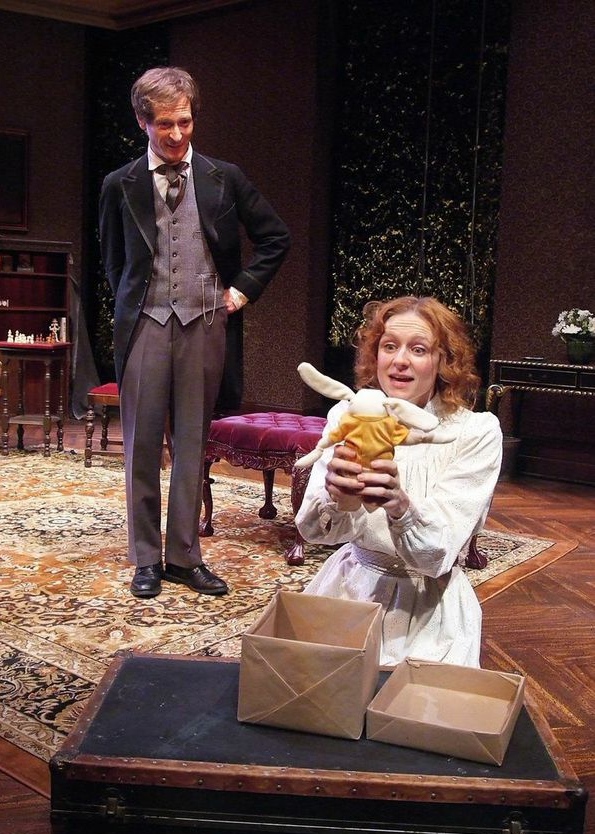Theatre doesn’t require a strict adherence to fact; it is famous for distilling broader truths from smart invention. So a play about the famous pages intentionally torn (and never found) from Lewis Carroll’s voluminous diaries is just the tantalizing sort of idea that allows for unhindered speculation. A perfect set-up for dramatic intrigue.
Playwright Lily Blau, who wrote The Missing Pages of Lewis Carroll, now at Pasadena’s Theatre @ Boston Court, is entitled to take any liberties she chooses with the suspected (but unproven) pedophilic inclinations of Charles Lutwidge Dodgson, aka Lewis Carroll.
Those missing pages go back to a time when Carroll — a troubled, brilliant man who also was a poet, mathematician, logician, Anglican deacon, and admired photographer, shared a deep friendship with the family of Henry Liddell, Dean of Christ Church, Oxford. Their daughter Alice (one of three sisters) inspired Carroll’s Alice in Wonderland, whose success led to another Alice book. These edgy inventions were not the first time Carroll had written off-the-wall imaginative works and poems, but the deep friendship he enjoyed with the Liddells was greatly curtailed, if not entirely ended, after June 27, 1863, the date of one of the seven missing diary pages.
What happened? Nobody knows. And no one knows why the pages were removed by the surviving Dodgsons, presumably hoping to protect the family name. Alice Liddell was just 11 years old on June 27, 1863, fueling suspicion that some inappropriate romantic episode might have occurred on that date — or been narrowly averted. The mystery endures.
This opens the door wide for Blau’s mildly erotic fantasy about the fateful pages. Carroll’s life — his battle with stuttering, his depressions, general affection for and comfort around young girls, and his complicated but real and profound sense of personal guilt — would seem to support the playwright’s speculations.
However, Blau and Sydney Gallas, who collaborated with her on the play’s development, build a case around the possibility that Alice was the aggressor in this relationship, an Alice depicted here as a highly precocious, willful child of 11 — elements that are fully embraced in Corryn Cummins’ strong, even forward, performance in the role.
Blau also smartly injects the undefined presence of The White Rabbit (a playfully surreptitious Jeff Marlow) as a wise alter ego and warning bell for Dodgson/Carroll. Once out of his rabbit hole, White Rabbit slips in and out of the action, connecting dots and goading Dodgson. Leo Marks, who plays the fundamentally timorous Dodgson/Carroll, skillfully provides the full complexity of the man, in a lucid and furtive performance that includes the poet, the arrested child within, the stutterer and the tortured soul.

The play builds to a vivid royal wedding scene, replete with fireworks, in which the Liddells are transmogrified into creatures from the Alice books, with Mrs. Liddell (the impressive Erica Hanrahan-Ball) decked out in a breathtaking gown as the imperious Red Queen. It is the finest achievement of cross-fertilization between Victorian England’s rigors and Lewis Carroll’s fantasyland, with the momentum rising to a pitch of frenzy — and to a crucially catastrophic moment for Alice and Dodgson.
More of this kind of theatrical invention would have been welcome in a play that has so many things to recommend it, but that tends to deflate after that high point as it moves on to a fairly flat and overwrought conclusion.
One difficulty in director Abigail Deser’s staging is the overemphasis placed on an arch upper-class English diction, adopted by all, that is too often hard, if not impossible, to understand. Wanting to be true to place, time and character is commendable, but not when it trenchantly interferes with comprehension. Too much tends to be lost on the ear. A reasonable softening of the speech would benefit everything — and everyone.
The clever single-unit set by Stephen Gifford doesn’t always differentiate clearly between locales, something that could easily be fixed. But Garry Lennon’s lush period costumes, Keith Skretch’s video segments, Jaymi Lee Smith’s lighting and the music and sound design by John Ballinger all provide fine enhancements.
If the production is not quite there yet, it is surely worth pursuing. It may never be more than a fascinating look at a black hole in literary biography, but theatre knows how to feast richly on such stuff — and there is always room in theatrical annals for a well-crafted take on such a captivating mystery.
WHAT: The Missing Pages of Lewis Carroll
WHERE: The Theatre @ Boston Court, 70 N. Mentor Avenue, Pasadena, CA 91106
WHEN: Thursdays-Saturdays, 8pm; Sundays, 2pm. Through March 1 Added performance: Wednesday, Feb 25, 8pm
HOW: Tickets $34 at www.bostoncourt.org or (626) 683-6883. Senior, student & group discounts are available
Top image: The assembled cast of THE MISSING PAGES OF LEWIS CARROLL. Photo by Ed Krieger.
